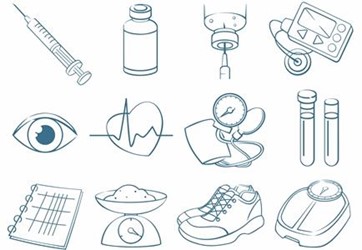"We Are Only Diabetes"

By Bob Marshall, Chief Editor, Med Device Online

Can you solve the riddle? Who is this medical device company?
- The company is one of the four major players in its medical specialty, with 2016 sales of almost 1 billion Euros.
- In 2017, the company strengthened its position as a key partner in its medical specialty by adding an agreement with Insulet to its existing alliance with Medtronic.
- The company’s products are sold in more than 125 countries and used by approximately 10 million people worldwide.
- The company employs almost 2,000 people and has operations in 30 countries.
- The company’s app, which integrates with the product, has been launched in over 30 countries and boasts more than 135,000 registered cloud users.
- The company’s flagship product was awarded a seal of approval for accuracy, in its medical specialty, by a national technology society finishing first in accuracy among the 18 most popular systems in that medical specialty in the U.S.
It’s a relatively newer name in the space, but with a long history of successful medical device development. Established in 2016 through Panasonic Healthcare Holdings’ acquisition of Bayer Diabetes Care, Ascensia Diabetes Care is a global company dedicated to improving the health and lives of people with diabetes. I couldn’t help but think of Ascensia as a toddler with a PhD as I spoke with its CEO, Michael Kloss.
As Kloss explained some of the organization’s history and talked about their current objectives and priorities, I could sense his well-deserved pride in that which has gone before him, a tremendous energy for where the organization is today, and enthusiasm for where it will go in the future.
I recently explored whether wearables are improving outcomes and, as I spoke with Kloss on the topic, he referred to it as the “dilemma of prevention.”
“When you look at our clinical efforts in the past, they were there to prove that our products worked, and we used the results to register our products in various markets. We may have made efforts to compare our systems to other systems to prove superiority,” Kloss explained.
“But very little money was spent to show a clinical outcome of people testing versus not testing because, for a long time, it didn’t have relevance… As we speak, our company and other companies in the sector are moving toward this shift to think about more complex clinical studies, looking at patients more holistically, and understanding what really influences patient behavior and what influences a better clinical outcome for diabetes.”
Ascensia Diabetes Care and three other large players — Roche, LifeScan, and Abbott — garner the largest portions of market share in the blood glucose monitoring sector. I asked Kloss what differentiates his company from the others.
“We are not diluted, or interfered with, by any other businesses we have around. We have clearly set our vision and strategy toward integrated diabetes solutions. We have driven market share of our blood glucose monitoring (BGM) portfolio over the last few years. We believe that new technologies are important and we are working on them, but having a strong core BGM business will not go away and will also be important for any solutions afterward,” Kloss explained. “The clarity around what we want to do and the way we are setting it up, paired with the commercial strengths we have across the globe, are keys to our success.”
Kloss also provided some insight on the source and depth of Ascensia’s commitment to focus solely on diabetes care.
“Last year, we asked our employees what should be our values. Usually, management comes up with the values — maybe working with some consultancy — and then comes out and says ‘these are the values of the company,’” he explained.
But, when Ascensia was created two years ago, management decided to ask the employees to set the company’s values. The employees returned with six core values, and one of them was, “we are only diabetes.”
“There was a lot of debate if we should use [that] one, because it is limiting ourselves,” Kloss said. But, ultimately, he decided that the “clear focus will really guide our decisions and drive new opportunities for patients, and for us going forward as a company.”
This exclusive focus on diabetes care is fully warranted from both a business and humanitarian perspective. Consider these statistics from the World Health Organization (WHO):
- The number of people with diabetes has risen from 108 million in 1980 to 422 million in 2014.
- The global prevalence of diabetes among adults over 18 years of age rose from 4.7 percent in 1980 to 8.5 percent in 2014.
- Diabetes prevalence has been rising more rapidly in middle- and low-income countries.
- Diabetes is a major cause of blindness, kidney failure, heart attacks, stroke, and lower limb amputation.
- In 2015, an estimated 1.6 million deaths were directly caused by diabetes.
- Almost half of all deaths attributable to high blood glucose occur before the age of 70 years.
- The WHO projects that diabetes will be the seventh leading cause of death in 2030.
So, what will Kloss and Ascensia focus on next?
Kloss said he sees value in providing device connectivity as an option to all users. Currently, some Ascensia products do not have built-in connectivity, but Kloss sees the potential of connectivity to add value for all users in an integrated care model. He also states as a priority making glucose level measurement more painless for users, and Ascensia is working on solutions in this area.
Finally, Kloss mentioned that he is constantly looking for ways to bring the diagnostic, treatment, patient, caregiver, and payer closer together for the best possible outcome.
“We want to make diabetes as invisible to daily life as possible,” he concluded.
